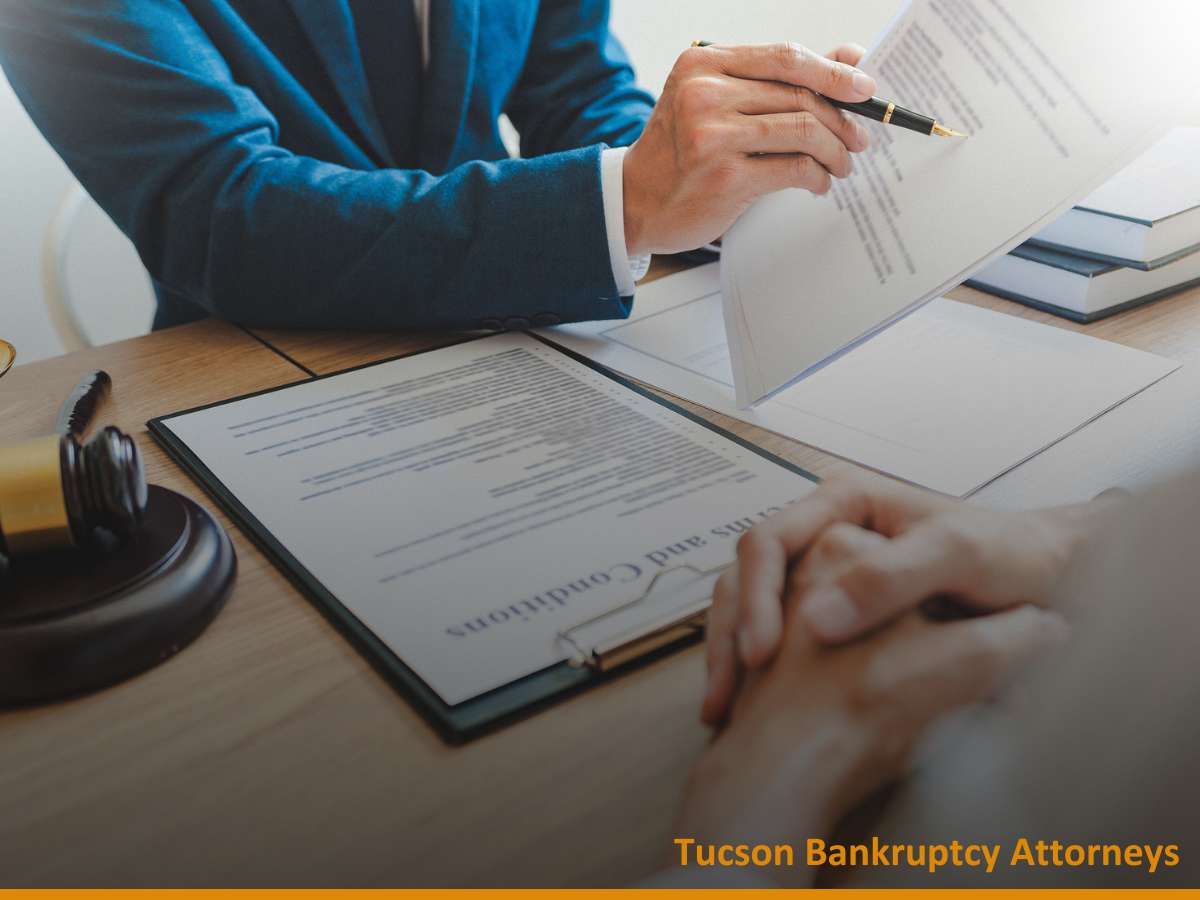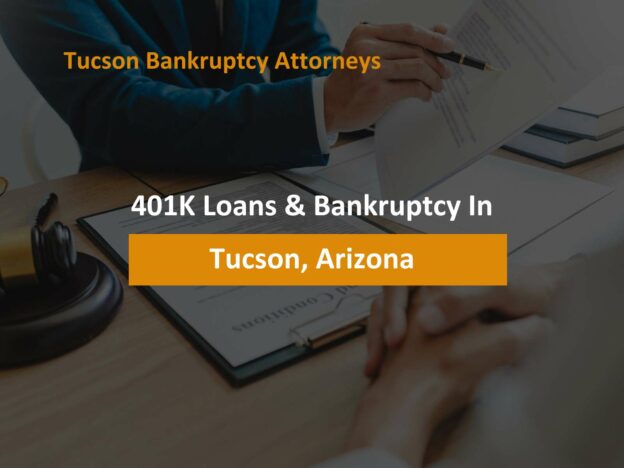Everywhere you look, expenses are on the rise. Groceries cost more than ever, and interest rates make it harder to escape the cycle of renting and purchase a home. When someone is in a tight spot financially, there are limited options to come up with cash quickly. Personal loans and payday loans come with predatory interest rates and other loan terms that make it difficult to pay them back on time and without extra fees. For a person with retirement savings, a 401(k) loan could be a fast way to come up with a lump sum of cash, but it doesn’t come without risks. If you’re considering a 401(k) loan to pay off debts in Tucson, Arizona, there could be other forms of debt relief that wouldn’t put your retirement savings in jeopardy. Let our experienced bankruptcy team guide you through your options with your free consultation- call 520-307-0020 to schedule today.

More Information About 401(k) Loans
When someone is in a pinch, they might dip into their retirement savings to make ends meet. Many people are aware that a 401(k) can be withdrawn from, but it comes with financial penalties. Another option is to take a loan from 401(k) savings. A 401(k) loan can help the borrower reduce financial penalties and pay those savings back into the account. 401(k) plan sponsors are not required by law to provide loans, but many choose to do so anyway. A borrower can take out up to the lesser of 50% of their account balance or $50,000. The loan should be paid back within a 12-month period. The loan can be repaid through automatic deductions from the borrower’s paychecks, just like their 401(k) contributions. There is a requirement to pay the loan back within 5 years, but this can be extended if the borrower used the funds to purchase a home. On the flip side, the borrower will not be penalized for repaying the loan early.
The argument against early withdrawal from retirement savings is mainly how expensive it becomes through tax penalties. But 401(k) loan borrowers are not charged the 10% penalty if they repay the loan within the prescribed time period. Paying a loan back can be less risky if the loan is automatically paid out of the borrower’s paychecks, but what happens when if they stop receiving that paycheck? A 401(k) loan borrower who quits their job or is fired during the loan payback period could face issues. Leaving a job during a 401(k) loan repayment period can speed up the due date for repayment. If the borrower can’t repay it quickly and is under the age of 59 ½ years old, they will incur a 10% tax penalty in addition to still having the loan balance.
Should I Address Debts With a 401(k) Loan Or Bankruptcy?
A 401(k) loan generally shouldn’t be used for ordinary expenses and non-emergency situations- it is considered most effective when the borrower needs a short-term lump sum of cash. For example, the borrower could have a medical procedure or college tuition that needs to be paid for sooner rather than later. A person with 401(k) savings may also be inclined to take out a loan if they have creditors on their back, making threats of debt collection actions. For example, a borrower might take out a loan to pay off mortgage arrears and stop a home foreclosure. But when the issue is debt rather than an expense that hasn’t yet been incurred, bankruptcy offers some advantages that aren’t available for 401(k) loans.
Oftentimes, when a person is struggling with debt, their debt comes from more than one source. For example, a borrower might have been injured in a car accident and owe medical bills, have accrued credit card debt from missing work, and could even have a judgment against them if they were at fault for the accident. Depending on how much these debts are combined, a 401(k) loan may or may not be able to cover the total balance. If not, the borrower could end up draining their retirement savings just to still be in debt. Here, filing for bankruptcy could clear these debts and allow the debtor to retain their retirement savings. Bankruptcy could be inevitable, and trying to pay off debts to avoid the inevitable is like throwing money down the drain.
Another reason to consider bankruptcy over a 401(k) loan is the automatic stay. The automatic stay is a protection provided to bankruptcy debtors and not to 401(k) loan borrowers. It creates a shield between the debtor and their creditors. It can stop collection efforts like lawsuits, wage garnishments, vehicle repossessions, home foreclosures, and more. The automatic stay can create peace of mind while the debtor sorts out their debt issues and creates a path to a brighter financial future.
Can 401(k) Loans Be Discharged In Bankruptcy?
The short answer to this is, unfortunately, no. A person who takes out a 401(k) loan is essentially their own creditor. A 401(k) loan can’t be discharged in bankruptcy, which can be a disadvantage when compared to other types of loans such as personal loans and payday loans. Chapter 7 bankruptcy only discharges debts, so it will have no effect on a debtor’s 401(k) loans besides protecting the debtor through the automatic stay for the lifespan of the case. A chapter 13 bankruptcy pays off non-dischargeable debts- debts that could be discharged in a chapter 7 will be paid off in the plan or discharged upon completion of the payment plan, depending on what the debtor’s income will allow them to pay during the payment plan. A chapter 13 payment plan lasts 3 years if the debtor’s household income falls below the state median and 5 years if the debtor’s household income is above the state median. If you have questions about 401(k) loans and how they relate to bankruptcy, our experienced lawyers are here to answer your questions with no fee or obligation. To schedule your free phone consultation today, call 520-307-0020.
Learn More About Your Options With Our Knowledgeable Lawyers
Bankruptcy could be a preferable option to taking out 401(k) loans, but there are some consequences to declaring bankruptcy. The debtor’s credit score could drop drastically (although it could stay the same or even increase- it all depends on the debtor’s prior credit history.) Bankruptcy debtors are disqualified from most home mortgages for 2 years, and will lose their credit cards and need to apply for new ones after discharge. Any assets that aren’t protected by bankruptcy exemptions could be taken by the bankruptcy trustee, who will then sell them at auction to pay back creditors and keep a portion of the proceeds as payment. Additionally, there are strict income requirements to both chapter 7 and chapter 13 bankruptcy that the debtor must meet or their case can be dismissed. But once all of these obstacles have been navigated, bankruptcy can be a tool to get a debtor back on track and ward off creditors. If you have questions about the bankruptcy process, including how it can affect 401(k) loans, contact our Tucson Bankruptcy Lawyers for your free consultation by contacting us or calling 520-307-0020.
TUCSON BANKRUPTCY ATTORNEYS
2 East Congress Street, Suite #900-6A
Tucson, AZ 85701
Office: (520) 307-0020
Website: https://tucsonbankruptcyattorney.co/

